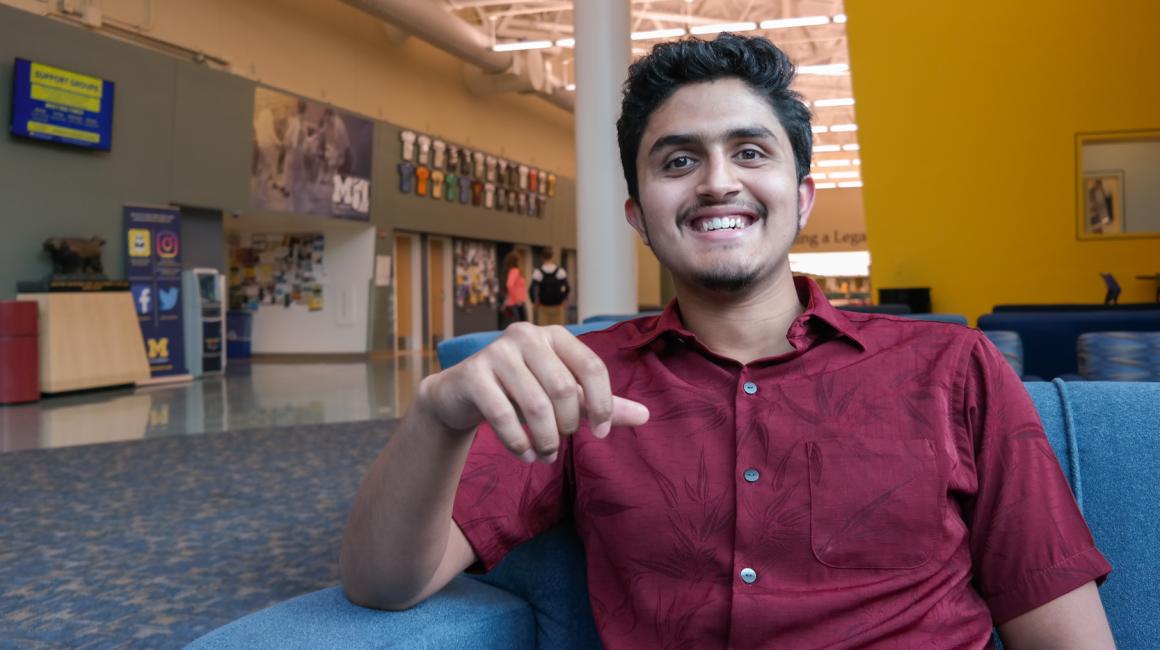
Many undergraduates pursue research or enter an essay competition at the urging of a faculty mentor. Eighteen-year-old freshman Syed Akbari entered the prestigious John Locke Institute Essay Competition because he Googled it.
“I think it was the second result that came up when I searched for ‘philosophy essay competition,’” he said, smiling. “The thing that kind of got me going was that when I was applying to colleges, one interviewer asked about what subjects I was ‘world class’ in. And I was honest: I said I’m not world class in anything, but there were subjects, like philosophy, that I’ve studied more than the average person. But then I realized I didn't have anything to back that up. And I thought if I won some kind of competition or award, that would be a cool thing to have.”
It’s worth mentioning that philosophy isn't even Akbari’s major (though he does intend to add it eventually as a second-major complement to his current one in data science). It’s also worth noting that the John Locke Institute’s annual essay competition was the second result in Google for a reason: It’s a pretty big deal — it’s co-sponsored by Princeton and Oxford — and every year draws thousands of entries from students all over the world.
Akbari, however, wasn't aware of that and approached the contest with the casualness of dropping his name in a raffle. He browsed through the list of essay prompts, found one that resonated with him and picked a few books that he thought might help him from his personal summer reading list (everything from The Moral Landscape by Sam Harris to Life Laid Bare: The Survivors in Rwanda Speak). And then five days before the competition, he wrote his essay on the topic of whether the practice of philosophy is still relevant. He laid out a precise, analytical argument for why it is.
Then he waited. In fact, he made a note of the date the institute would notify the winners; and when the date passed, he sent the committee an email. When the reply came a day or so later, he learned there were so many entries (from 102 countries) that the judging had been delayed.
“At that point, I thought, ‘Whoa, I have no chance.’ I assumed my best shot was if hardly anyone entered.”
But then a few more days passed, and he got another email.
“It started with ‘unfortunately,’ and I’d just been through the college application process so I knew anything that starts with ‘unfortunately’ isn't going to end well. So I just put down my phone,” he said. “But then a couple hours later, I picked it up and read the whole message. And it said unfortunately this year they received so many entries that it caused a delay. So I kept reading until I saw: ‘That’s why it makes your achievement so impressive.’”
Akbari had placed among the handful of finalists, which carried with it a multi-day stay at Oxford for the awards ceremony. The only hiccup was going to be scaring up the $1,000 for a plane ticket. A friend of his suggested that he might be able to get funding from the university, at which point Akbari simply started asking around — first emailing his dean in the College of Engineering and Computer Science; then following a trail of suggestions from helpful people in College of Arts, Sciences, and Letters, which eventually led him to Philosophy Professor Maureen Linker.
“She was literally the last person I talked to and the first person who told me: ‘I’m going to fight for this. We’re going to find you the funding.’”
Then hours later, an email reply arrived from College of Engineering and Computer Science Dean Tony England’s office with a second vote of support. Between the two colleges and some additional funds from Dean of Students Amy Finley, they pulled together enough last-minute funding to cover Akbari's plane ticket.
“Oxford was so amazing. Everything felt like a castle. The dinners were lit with candlelight, and the food was crazy — there was caviar and salmon and lamb roast. We were all kind of laughing together about how extravagant it was.”
Akbari tied for fifth in the philosophy category. Don’t expect this to be his last fearless foray into competitions: He’s currently working on an entry for another essay contest, eyeing a poetry slam (another one of his interests) and making plans for an upcoming hackathon. The first time he did the latter, it was simply because a friend invited him.
“I was literally Googling, ‘What is a hackathon?’ on the way in the door,” he said. “But, if you see an opportunity, you should take your shot, right? I mean, what’s the worst that could happen?”
And sometimes, when you just bother to try, some really good stuff can happen too.




